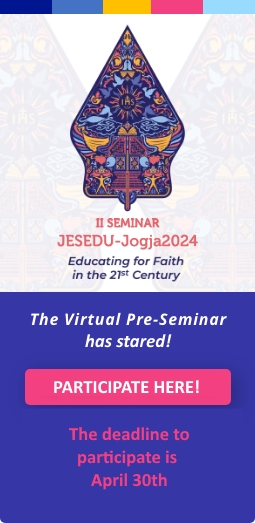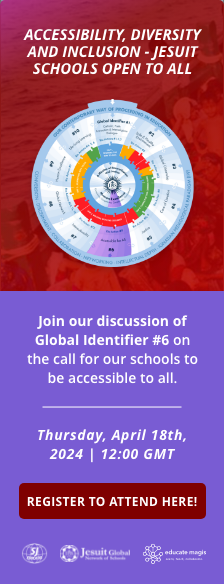CHANGE aims to encourage students (13-18 years old) to think critically about the issues of refugees, migration and creating inclusive societies. It has been launched by JRS Europe, together with 8 partners in 8 other European countries.
One of its major components is a pedagogical programme; structured into 6 ‘Stages’.
Each stage includes 1) a lesson plan for the teacher, and 2) a worksheet for the students. All materials and worksheets are available online and can be downloaded. More information on the 6 stages can be found here.
In the light of the exceptional measures related to COVID-19, JRS Europe invites teachers to make use of the CHANGE materials and activities online. Below is a table which underlines the activities that students can do from home for each phase. The proposed materials are also indicated.
For your convenience, we have put together a Collection, in which you can find all documents and materials on the 6 phases (in English). Please note that the videos mentioned in the table are accessible in this YouTube playlist.
Moreover, at the end of each stage, the students can carry out the reflection exercises, and can keep track of them in a notebook. The activities could easily be followed up and the students’ work discussed in the class once schools will have re-opened.
If you intend to use CHANGE materials and activities with your students, we kindly ask you to fill in this registration form. You can either fill it in online; or manually here and then send it to us via e-mail: anouk.severin@jrs.net.
We would highly appreciate it, as it would give us an insight on the usage of the CHANGE pedagogic program in these circumstances.
If you have any questions or need more information, please do not hesitate to contact us, leaving a message in the comment box bellow, via e-mail: anouk.severin@jrs.net , or by phoning Anouk Severin at +31 6 47 27 00 20.
We would be happy to support you!
Stage 1: “Self-awareness and self-esteem”
| Objectives | Exercises/Steps | Materials |
| Students reflect and become aware of their own values, experiences and attitudes in relation to the themes of migration and refugees.
Students’ curiosity for these topics is triggered as they formulate their personal questions on these issues |
Step 1: students create their ‘personal profile’.
Step 3.1: students answer the questions in ‘my experience with refugees’ Step 3.2: students watch the videos suggested and answer the questions in ‘when the subject of flights takes a face’ |
Stage 1 student worksheet
Videos: The story of Hiba from Syria The story of Filimon from Eritrea |
Stage 2: “Researching the complex topic of migration and refugees”
| Objectives | Exercises/Steps | Materials |
| Students actively acquire knowledge by researching the topics of migration and refugees: facts, causes of flight, the situation of refugees in Belgium and/or in more local context.
Students learn how to analyse and differentiate sources (credible vs fake ones); and distinguish facts from opinions.
|
All three steps can be done:
Step 1: Research Assignment 1 Step 2: Research Assignment 2 Step 3: Students can individually or in pairs (if possible to discuss online) make a PowerPoint presentation and answer the questions of Step 3 to reflect on their research process. |
Stage 2 student worksheet
https://www.jrschange.org/useful-information-sources-2/
https://www.jrschange.org/glossary-of-the-most-important-terms/ |
Stage 3: “Changing perspectives”
| Objectives | Exercises/Steps | Materials |
| Students are able to gain more insight into the experiences of refugees and gain meaningful knowledge.
Students develop their socio-emotional skills. |
Although students cannot encounter and exchange with a refugee in person while being at home, they can engage with Step 1 by watching the proposed videos and then answering the questions. |
Videos:
|
Stage 4: “Forming and representing judgments”
| Objectives | Exercises/Steps | Materials |
| Students actively acquire a comprehension of the rights, needs and interests of refugees by trying to put themselves in their shoes.
Students learn how to make and defend their own value-based judgements in relation to the themes. |
Step 1: students can develop a Charter of Refugee Rights.
Step 2: students can watch the proposed video(s) and answer the questions. (Step 3: students could in groups – online – prepare the role-play; which could be done in the future once schools re-open). |
Stage 4 student worksheet
Videos:
What are the universal human rights?: |
Stage 5: “Dealing with prejudices”
| Objectives | Exercises/Steps | Materials |
| Students learn how to identify prejudices, stereotypes and generalisations often attributed to refugees and/or forced migrants, and the phenomenon of migration.
Students explore and learn about strategies for how to counter these prejudices and generalisations. |
Step 1: students can watch the proposed videos and answer the questions.
(Step 2: students cannot engage in the role play, but they can read through the strategies to counter stereotyping). An alternative activity proposed: invite students to go back to their research assignments in Stage 2, and to identify potential prejudices, stereotypes and generalisations in the news articles & other sources. |
Stage 5 student worksheet
Videos:
|
Stage 6: “Getting into action”
| Objectives | Exercises/Steps | Materials |
| Students recognise their own possibilities to act upon the issues of refugees, migration and diversity.
Students are encouraged to raise awareness on these topics in their schools or communities through actions. |
Different steps for students to think about and develop their action are indicated here
|
Stage 6 student worksheet
Students can also refer to these webpages, which gives detailed information on the type of actions they could undertake and how to so: |

